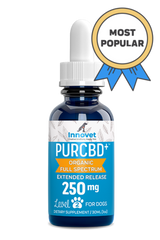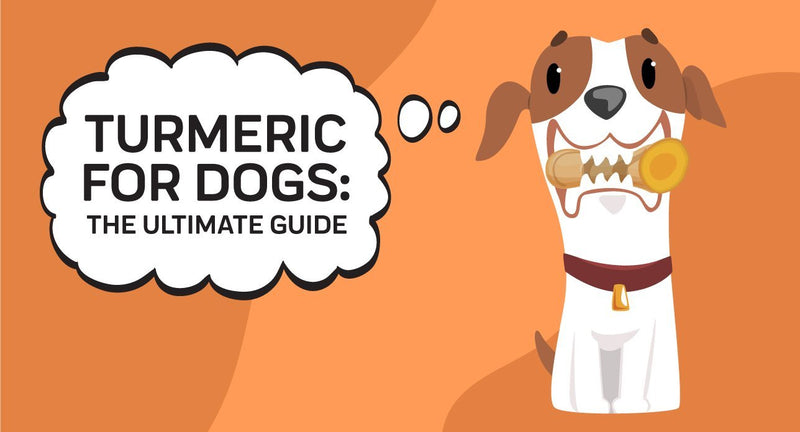- What Is Alprazolam For Dogs?
- What Does Alprazolam/Xanax Do?
- Dog Anxiety Symptoms
- Alprazolam Doses For Dogs
- How Does Alprazolam Work?
- Dog Alprazolam Vs. Human Alprazolam
- Alprazolam Benefits For Dogs
- Does My Dog Need Alprazolam?
- Alprazolam Side Effects
- Alprazolam For Dogs Precautions
- Types Of Alprazolam For Dogs
- Alprazolam Drug Interactions
- Natural Anti-Anxiety Options
- Finding The Best Supplement For Dogs To Treat Anxiety
- Top CBD Products
- Sources
Anxiety is rough on everyone, including our dogs! While you might not have known that they can experience anxiety, the symptoms they experience can be just as crippling as ours. Furthermore, this anxiety can cause problems in relation to their mood and behaviors in the same way it can for us. The only real difference is that they can't communicate it as well as we can. Pet owners should take note of some of the following causes and what to watch for when it comes to anxiety disorders in dogs.
Some common reasons why dogs experience anxiety are:
- Separation from you or other family members
- Car rides
- Loud noises, like thunder or fireworks
- Stress in the home
- The fear of new places, animals, or people
When they're experiencing these kinds of anxiety, that experience can range from small amounts of anxiety to full-on panic. These anxiety situations are mainly what Xanax for dogs is used for. In addition, if the uncomfortable scenario continues for too long, it can result in depression. Luckily, prescription medications making use of the ingredient for dogs, alprazolam can be highly useful in helping with treating dog anxiety.
What Is Alprazolam For Dogs?
Alprazolam is the key ingredient in a number of dog anxiety medications, including dog Xanax. While Xanax is the brand name, alprazolam represents the generic version of the same essential drug. Alprazolam is a benzodiazepine tranquilizer capable of relieving anxiety, muscle relaxer, and working as an anticonvulsant.
When your dog is experiencing anxiety, it's often due to intense feelings of nervousness coming from the central nervous system. Alprazolam dog anxiety medications seek to suppress that system, allowing the symptoms of anxiety to be reduced. Xanax for anxiety can also be a useful tool situational anxiety when your dog is restless and unable to sleep, allowing for better rest.
What Does Alprazolam/Xanax Do?
While most think of anti-anxiety medication like Xanax and alprazolam in relation to anxiety, it can also be used for a variety of purposes. For example, it can also be used to assist with depression when your canine friend is experiencing intense grief. However, keep in mind that it can become a cause of depression when it's relied on for too long.
Xanax can also be used for treating a lack of appetite, a spastic colon or even behavior modification. The medication also offers anticonvulsant and muscle relaxing properties. If your dog is experiencing any of these issues, then it's worth talking to your vet to see if this medication is a good option for them.
Dog Anxiety Symptoms
Most of the time, the anxiety that a dog is experiencing becomes clear through their behaviors.
Such behavioral symptoms can include:
- House-trained dogs having “accidents” in the home
- Avoidance, hiding, or running from owners
- Whining, barking and howling to excess, especially when alone
- Behaving in unpredictable or moody ways
There can be a variety of reasons why dogs experience anxiety. Some are just more nervous by nature and have a harder time relaxing, especially when there is a lot going on around them.
Meanwhile, others can experience anxiety due to being removed from those they love or need. This can include separation anxiety connected to a dog's owners, or in relation to being taken from their mothers at too early of an age. While they might be cute when they're small, it's best to give them a little time to grow before bringing them to a new home.
Alprazolam Doses For Dogs
Depending on the needs of your dog, there are liquid and tablet forms. You'll also find a few different dosage sizes in order to get the one that is easiest to give to your dog without risking an overdose as it is a controlled substance.
Most commonly, the tablets are available in 2mg, 1mg, 0.25 and 0.50mg Xanax/alprazolam doses. Generally speaking, your vet will consider the weight and size of your dog when prescribing the correct alprazolam dosage for dogs. For example, small dogs are likely to receive a Xanax .25mg dose. Typically, it's also normal to begin with a lower dose and only increase the amount if absolutely needed.
It's also worth keeping in mind that the maximum for dog Xanax dosages within a 24-hour period is 4mg. This is regardless of the size or type of dog. If for some reason they have prescribed the medication in liquid form, then they may receive either 1ml or 5ml container. Typically, these have different concentrations of the actual medication, depending on the size of the dog.
Whether it's the Xanax dosage for dogs or the dosage of another anti-anxiety medication, your vet will be able to make sure that your dog gets the correct dosage, so follow their instructions carefully! Because they are essentially the same thing, you shouldn't worry if you see alprazolam .5, .25, 1mg, etc, rather than Xanax. They are rather interchangeable.
How Does Alprazolam Work?
Largely, alprazolam medications work through managing the levels of natural chemicals in the brain. This is also how Xanax works since it is a name-brand version of alprazolam. As a result, most dogs are able to be calmed. It's an option that can be rather helpful for the short-term and can also help with depression or other issues.
Dog Alprazolam Vs. Human Alprazolam
For the most part, doggy Xanax and other anti-anxiety medications that contain alprazolam are designed for human use. Consequently, they can be helpful for dogs but aren't the most ideal options for them. Keep in mind that by no means should you give your dog Xanax prescribed for you, if you have it. The Xanax for dogs dosages are also likely to be different than the dosage you would take.
Alprazolam Benefits For Dogs
When used in smaller doses and only for shorter periods, alprazolam can be extremely useful in assisting dogs with high levels of anxiety, depression, or issues with a spastic colon. If other methods you've used to try to calm your dog down haven't worked, discussing the issue with a vet may result in a prescription.
Does My Dog Need Alprazolam?
This is worth considering very carefully before seeking out a prescription. If there are natural methods you can use that work to relax your dog, then using those options is ideal. Medications containing alprazolam should only be used as a last resort for anxiety.
While dogs can take Xanax or other anti-anxiety medications, it's worth looking for safer options first. Xanax and dogs won't always be a friendly combination especially if they are taking other drugs and/or prescription medications, this will need to be observed vey closely.
Alprazolam Side Effects
While it can be a useful tool when it comes to dealing with high levels of anxiety in your dog. It's important to have an understanding of the side effects of alprazolam so that you know when your dog is experiencing them.
Most commonly, Xanax effects in dogs can result in them becoming sleepy. In other cases, dogs may experience diarrhea, vomiting or gas.
If you notice that after they have taken the medication, your dog seems to become more clumsy, or is lethargic, then it may be worth talking to your vet about a lower dosage. The idea is to calm them, not to leave them with side effects of dog Xanax that are so bad they can barely walk.
There can also be situations where your dog is allergic to the medication. It's extremely important to watch out for side effects that represent that issue. If you notice any of the side effects we list below, it's best to let your vet know immediately.
Symptoms that are related to an allergic reaction can include:
In some situations, you may find that your dog's behavior becomes aggressive or hyper after taking the medication rather than calmed. These are known as paradoxical effects.
It's also worth watching out for the possibility of withdrawal symptoms, which can occur if your dog has been taking an alprazolam medication for a longer period of time. To help with avoiding this kind of dependency, it's best to only use enough of these medications to relieve the symptoms for the short term.
Withdrawal symptoms from the medication can include:
- Photophobia
- Vomiting
- Shaking
It can also be a good idea to ask your vet about the long term side effects of Xanax and other alprazolam medications for anxiety disorders. If you've never used it or given it to a pet before, then your vet can also give you an idea of how long it takes for Xanax to work. Make sure that you don't provide multiple Xanax doses if the first doesn't appear to be working.
Alprazolam For Dogs Precautions
There are some conditions worth considering when it comes to using Alprazolam for your dog. For example, dogs who have problems with weakness in the muscles, problems with kidneys or the liver should not use these medications.
Furthermore, dogs that are elderly, disabled in some way, pregnant or dealing with glaucoma or kidney disease shouldn't take Alprazolam medications if it can be avoided. Make sure that every possible option is discussed with your vet so that you can make the best choice for your pet.
Types Of Alprazolam For Dogs
Xanax for dogs certainly isn't the only anxiety medication option out there. Make sure to discuss other choices with your vet before coming to a decision. Others might offer less of a risk of dependency or adverse reactions to dog Xanax or other medications that use alprazolam.
Alprazolam Drug Interactions
When considering medications containing alprazolam, it's worth keeping in mind your dog's medical history as well as any other medications they may be on.
Medications to consider when considering alprazolam include:
- Ketoconazole or similar antifungal medications
- Phenobarbital or other barbituates
- Antacids
Mixing these kinds of medications with alprazolam medications can result in negative effects like negatively affecting the metabolism of your dog, increased sedative effects or slow down the effectiveness of the alprazolam medications.
Please keep in mind that alprazolam medications like Xanax should never be given to your dog without the guidance of a vet. Xanax can kill your dog if the dose is too high, or at the very least leave them very ill. Furthermore, it isn't a medication that is approved for dogs by the FDA. It is mainly a human medication.
That said when used correctly and in ideal situations, it can be a useful short-term tool for assisting with anxiety and allow your dog to feel more relaxed.
If you choose to use these medications for your dog, make sure to keep a close eye on them. Each dog is different, and you never know when a medication may have a negative reaction requiring the help of a vet.
Natural Anti-Anxiety Options
Before seeking out a medication, it's best to look for natural ways to help your dog to calm down. The good news is, there are a lot of things you can try out before resorting to something with potentially negative side effects. Check them out below!
Exercise
Just like in humans, excess energy in dogs that isn't put to good use can become a problem. Consequently, it's a good idea to make sure your furry friend is getting plenty of time to run around and play. When their energy is used this way, they'll have less of it to focus on worry.
Furthermore, exercise is a great way to increase the levels of serotonin in your dog's body. This chemical is one that can help to balance out their mood and help them to avoid anxiety and depression. This benefit of exercise is also one that humans can experience, so it can be a great idea to exercise together!
Thunder shirts
Humans who experience anxiety can find that a weighted blanket is an extremely helpful way to cope with it. Similarly, dogs can use thunder shirts to gain comfort and feel a little safer when their anxiety is acting up.
It's worth keeping in mind that for some dogs, this option can be an absolute lifesaver. However, others may notice no change in their dog. It isn't a guaranteed option, but one that is absolutely worth trying out. It is a great option to use in combination with exercise, diet changes, and other natural methods to create the best possible results.
Calming Music
Mellow, soothing music may be able to help your dog more than you might think. You can even find some specially designed music to help with finding options that are suitable for dogs. If your dog experiences separation anxiety, then leaving a radio or TV on can be helpful.
In addition, dogs that have phobias that are related to noises can also be soothed with the help of music. Placing them into space where the unpleasant sounds will least affect them and putting on some calming sounds can help to keep them soothed and happy until the storm or fireworks are finished. There are really a variety of situations in which music might be helpful.
Finding The Best Supplement For Dogs To Treat Anxiety
For anxiety in dogs, natural supplements can also prove themselves to be highly useful. Before turning to medications, it's worth taking a look into what kinds of supplements are available to assist in bringing down the anxiety levels in your pet. There are some really great options out there!
CBD For Dogs
A choice that has been growing in popularity when it comes to treating a dog's anxiety as well as a number of other issues CBD. Though it may seem like a controversial choice, it helps to know that this is an option that is perfectly safe and can even help to avoid the side effects that can come with medications.
CBD For Separation Anxiety
Much like the medications that can be offered for treating a dog's anxiety, CBD can also work with the serotonin levels in the brain to keep your dog's emotions better balanced and help as well with separation anxiety. In addition, many quality CBD options avoid the inclusion of THC. As a result, your dog gets the benefits without any kind of “high”. It also comes in some very convenient forms that your dog will love!
Top CBD Products
Innovet offers some truly fantastic CBD supplements for dogs, cats, and even horses. They are made to be easy to dose out and easily given in the form of a treat, mixed with your dog's food, or dropped right into their mouth without an issue. Much easier than giving them pills!
CBD Oil
Innovet's Pur CBD oil for dogs is a great option when you want something very easy to provide in exactly the amount you mean to. It's often a great idea to start with very small amounts and give your pet a chance to get used to it before increasing the dose, and this package makes it easy!
CBD Treats
CBD dog treats are another great option that will make giving your dog their supplement as easy as giving them any other treat. The package also makes the dosing simple, providing instructions on the correct amount for small, medium, and large dogs so that everything is perfectly clear and very safe for your canine companion.
Sources:
CBD and Motivational Disorders
Anxiolytic and Antidepressant Benefit of CBD

















